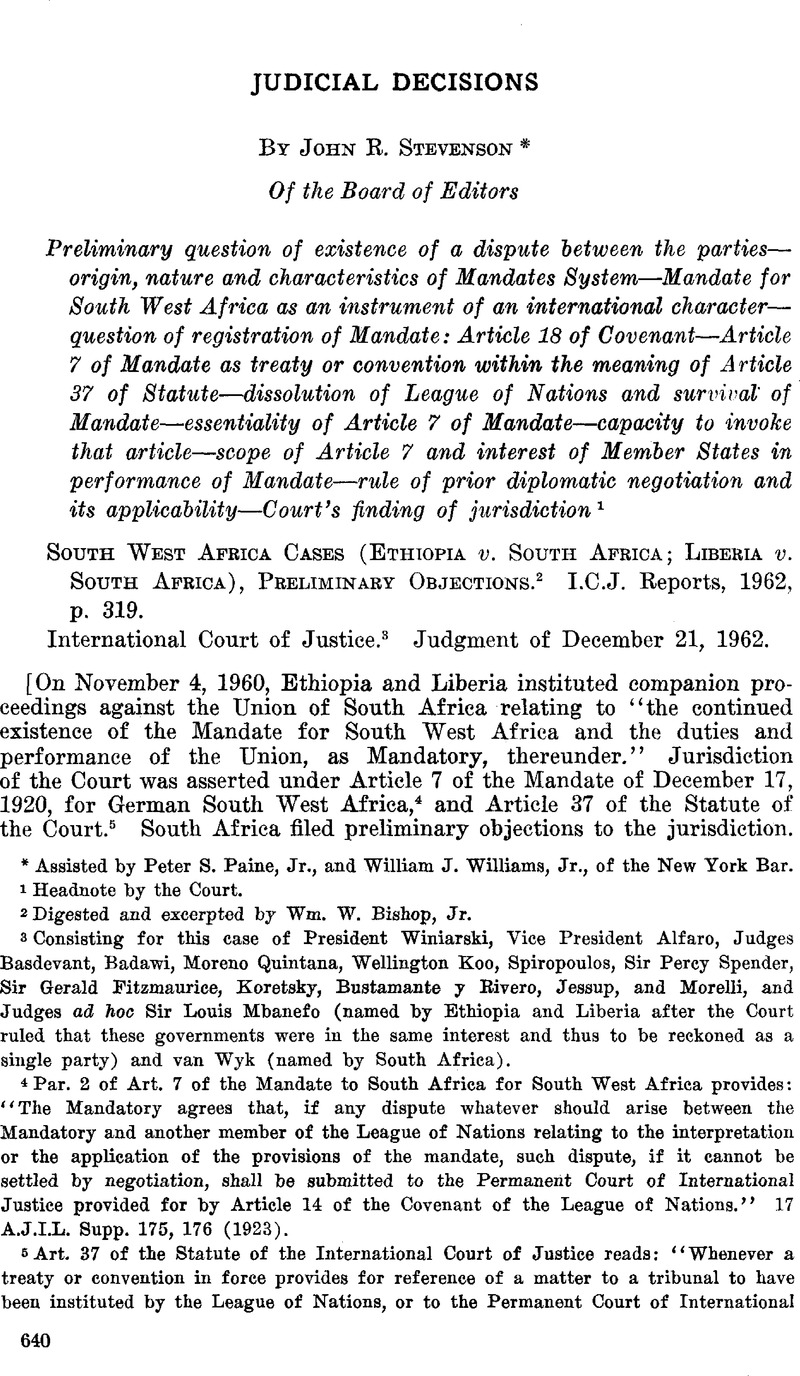No CrossRef data available.
Article contents
South West Africa Cases (Ethiopia v. South Africa; Liberia v. South Africa), Preliminary Objections
Published online by Cambridge University Press: 28 March 2017
Abstract

- Type
- Judicial Decisions
- Information
- Copyright
- Copyright © American Society of International Law 1963
References
1 Headnote by the Court
2 Digested and excerpted by Wm. W. Bishop, Jr.
3 Consisting for this case of President Winiarski, Vice President Alfaro, Judges Basdevant, Badawi, Moreno Quintana, Wellington Koo, Spiropoulos, Sir Percy Spender, Sir Gerald Fitzmaurice, Koretsky, Bustamante y Rivero, Jessup, and Morelli, and Judges ad hoc Sir Louis Mbanefo (named by Ethiopia and Liberia after the Court ruled that these governments were in the same interest and thus to be reckoned as a single party) and van Wyk (named by South Africa).
4 Par. 2 of Art. 7 of the Mandate to South Africa for South West Africa provides: “The Mandatory agrees that, if any dispute whatever should arise between the Mandatory and another member of the League of Nations relating to the interpretation or the application of the provisions of the mandate, such dispute, if it cannot be settled by negotiation, shall be submitted to the Permanent Court of International Justice provided for by Article 14 of the Covenant of the League of Nations.” 17 A.J.I.L. Supp. 175, 176 (1923).
5 Art. 37 of the Statute of the International Court of Justice reads: “Whenever a treaty or convention in force provides for reference of a matter to a tribunal to havebeen instituted by the League of Nations, or to the Permanent Court of International Justice, the matter shall, as between the parties to the present Statute, be referred to the International Court of Justice.” 39 A.J.I.L. Supp. 223 (1945).
6 Art. 22 of the League Covenant provided:
“ To those colonies and territories which as a consequence of the late war have ceased to be under the sovereignty of the States which formerly governed them and which are inhabited by peoples not yet able to stand by themselves under the strenuous conditions of the modern world, there should be applied the principle that the well-being and development of such peoples form a sacred trust of civilization and that securitiesfor the performance of this trust should be embodied in this Covenant.
“ The best method of giving practical effect to this principle is that the tutelage of such peoples should be entrusted to advanced nations who by reason of their resources, their experiences, or their geographical position can best undertake this responsibility, and who are willing to accept it, and that this tutelage should be exercised by them as Mandataries on behalf of the League.”
With respect to South West Africa and certain South Pacific Islands Art. 22 added that they “can be best administered under the laws of the Mandatary as integral portions of its territory, subject to the safeguards above mentioned in the interests of the indigenous population.” These safeguards were that the Mandatary “be responsible for the administration of the territory under conditions which will guarantee freedom of conscience or religion, subject only to the maintenance of public order and morals, the prohibition of abuses such as the slave-trade, the arms traffic and the liquor traffic, and the prevention of the establishment of fortifications or military and naval bases and of military training of the natives for other than police purposes and the defense of the territory.” Annual reports were to be required, a permanent Mandates Commission established, and “ the degree of authority, control, or administration to be exercised by the Mandatary” to be explicitly defined in each case by the Council if not previously agreed upon by Members of the League. See 13 A.J.I.L. Supp. 137-138 (1919).
7 It is greatly regretted that space limitations prevent reproduction, or even adequate digesting, of these separate opinions and dissenting opinions, which total 313 pages of the printed reports of the Court.




